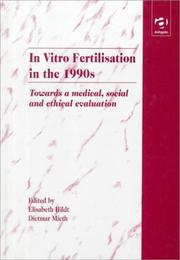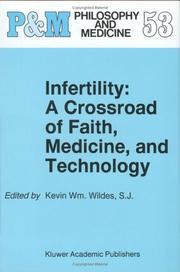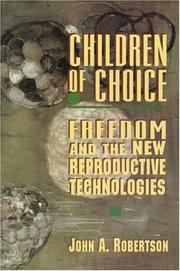| Listing 1 - 7 of 7 |
Sort by
|
Book
ISBN: 9065230327 Year: 1997 Publisher: Groningen Van Brug
Abstract | Keywords | Export | Availability | Bookmark
 Loading...
Loading...Choose an application
- Reference Manager
- EndNote
- RefWorks (Direct export to RefWorks)
in-vitrofertilisatie (bevruchting in vitro, proefbuisbaby's) --- kunstmatige inseminatie (kunstmatige inseminatie met donor, KID) --- fécondation in vitro (fertilisation in vitro, FIV, FIVETE) --- insémination artificielle (insémination artificielle avec doneur, IAD, insémination artificielle intra-conjugale, insémination artificielle avec conjoint, IAC)
Book
ISBN: 9060647335 Year: 1990 Publisher: Amsterdam Buijten en Schipperheijn
Abstract | Keywords | Export | Availability | Bookmark
 Loading...
Loading...Choose an application
- Reference Manager
- EndNote
- RefWorks (Direct export to RefWorks)
Drie opstellen over (en vooral contra) In Vitro Fertilisatie (IVF) vanuit orthodox-gereformeerde optiek.
Book
ISSN: 0777527X ISBN: 2804119238 9782804119232 Year: 1994 Volume: *35 Publisher: Bruxelles : De Boeck Université,
Abstract | Keywords | Export | Availability | Bookmark
 Loading...
Loading...Choose an application
- Reference Manager
- EndNote
- RefWorks (Direct export to RefWorks)
Enfants --- Famille --- Gezin --- Gynaecologie --- Gynécologie --- Kinderen --- Fertilization in vitro, Human --- Fécondation in vitro (Gynécologie) --- Moral and ethical aspects --- Aspect moral --- Infertility --- Reproductive Techniques, Assisted --- Fertilization in Vitro --- Bioethics --- Ethics, Medical --- psychology --- #GBIB:CBMER --- in-vitrofertilisatie (bevruchting in vitro, proefbuisbaby's) --- fécondation in vitro (fertilisation in vitro, FIV, FIVETE) --- Fécondation in vitro (Gynécologie) --- Fertilization in vitro [Human ] --- Motherhood --- Psychological aspects --- Infertility - psychology --- Reproductive Techniques, Assisted - psychology --- Fertilization in Vitro - psychology
Multi
ISBN: 906224372X Year: 1996 Publisher: Utrecht : Van Arkel,
Abstract | Keywords | Export | Availability | Bookmark
 Loading...
Loading...Choose an application
- Reference Manager
- EndNote
- RefWorks (Direct export to RefWorks)
In vitro fertilisatie (IVF)-reageerbuisbevruchting - riep in de jaren 80 veel emoties op. De pers bracht het beeld van wanhopige vrouwen die maar niet zwanger konden raken. De betrokken artsen presenteerden deze techniek als de oplossing voor de onvervulde kinderwens. Het toenmalige ministerie van WVC wist zich geen raad met IVF en liet de ontwikkelingen op hun beloop. De politieke partijen durfden geen duidelijk standpunt in te nemen. De vrouwenbeweging bediscussieerde of door IVF de autonomie van vrouwen bij de voortplanting wel groter werd. Intussen werd IVF op steeds groter schaal toegepast. Draagmoederschap, het gebruik van IVF door alleenstaande en lesbische vrouwen, eiceldonaties en embryoonderzoek, de kranten stonden er vol mee. In de commotie verdwenen de belangrijke vragen naar de effectiviteit en veiligheid van deze techniek naar de achtergrond. Noch de politiek noch de nationale overheid hield voldoende rekening met de belangrijke vragen van de vrouwenbeweging inzake voortplantingstechnieken. Besluiten werden genomen op basis van vooronderstellingen die ook nu nog niet hard zijn gemaakt. Dertien jaar na de geboorte van de eerste Nederlandse 'ivf-baby' is de veiligheid van ivf nog steeds niet degelijk onderzocht. Toch worden er steeds nieuwe, verdergaande bevruchtingstechnieken behandeld voor de onvruchtbaarheid van hun mannen.
Fertilization in vitro, Human. --- Medical innovations. --- Medical policy --- Technology assessment. --- in-vitrofertilisatie (bevruchting in vitro, proefbuisbaby's) --- Nederland --- feminisme (feministische visie) --- fécondation in vitro (fertilisation in vitro, FIV, FIVETE) --- Pays-Bas --- féminisme --- Fertilization in vitro, Human --- Medical innovations --- Technology assessment --- Assessment of technology --- Innovations, Medical --- Medicine --- Babies, Test tube --- Human fertilization in vitro --- Human in vitro fertilization --- Test tube babies --- Innovations --- Technological innovations --- Technological forecasting --- Technology and civilization --- Technology and state --- Medical technology --- Conception --- Human reproductive technology

ISBN: 1859726852 9781859726853 Year: 1998 Publisher: Aldershot Ashgate
Abstract | Keywords | Export | Availability | Bookmark
 Loading...
Loading...Choose an application
- Reference Manager
- EndNote
- RefWorks (Direct export to RefWorks)
This is a collected volume of papers from the first conference of the European Network for Biomedical ethics. The main subject of this conference is the ethical assessment of IVF in view of its concrete application as an infertility treatment and the consideration of possible alternatives for use. Twenty years after the introduction and the establishment of this therapy a more concrete evaluation of its medical indications, social conditions and consequences, the psychological consequences for the women involved and the parent-child relationship becomes possible. The legal and ethical evaluation of the reproduction technology as regards for example the legal and moral status of supernumery embyos in cryo-conservation has also to be considered in a European perspective. The ethical evaluation concentrates today on the new evolution that IVF technology takes in relation to the extension of diagnostics possibilities due to genetic research. Little work has been done on the connection between IVF and genetic diagnostics and therapy, so the medical and ethical evaluation of the connecting lines are also included in the book.
Fertilization in vitro, Human. --- Extrakorporale Befruchtung. --- Kongress. --- Fécondation in vitro (Gynécologie) --- Fécondation in vitro --- -Fertilization in vitro, Human --- in-vitrofertilisatie (bevruchting in vitro, proefbuisbaby's) --- vruchtbaarheid (fertiliteit, onvruchtbaarheid) --- embryostatuut (moreel statuut van het embryo, juridisch statuut van het embryo, potentiële persoon) --- pre-implantatie genetische diagnose (PGD) --- Babies, Test tube --- Human fertilization in vitro --- Human in vitro fertilization --- Test tube babies --- fécondation in vitro (fertilisation in vitro, FIV,FIVETE) --- fertilité (infertilité) --- statut de l'embryon (statut moral de l'embryon, statut juridique de l'embryon, personne potentielle) --- diagnostique génétique pré-implantatoire (DPI, diagnostic préimplantatoire) --- technique de reproduction (technique de procréation, procréation médicalement assistée, PMA, assistance médicale à la procréation, AMP, procréation artificielle) --- Reproduction Techniques. --- Fécondation in vitro (Gynécologie) --- Fécondation in vitro --- Fertilization in vitro, Human --- ethiek (ethische aspecten) --- reproductieve technologie (voortplantingstechnologie, medisch begeleide voortplanting, MBV, artificiële voortplanting, kunstmatige voortplanting) --- #GBIB:CBMER --- Conception --- Human reproductive technology --- Congresses --- Moral and ethical aspects&delete& --- Social aspects&delete& --- ethique (aspects ethiques) --- Ethics, Medical. --- Fertilization in vitro. --- Congresses. --- Moral and ethical aspects --- Social aspects --- Fertilization in Vitro. --- Reproductive Techniques. --- Recht. --- Ethik. --- Fertilization in vitro --- Moral and ethical aspects. --- Social aspects. --- Psychological aspects --- Aspect moral --- Aspect psychologique

ISBN: 0792340612 9401066051 9400902697 Year: 1996 Volume: 53 Publisher: Boston Kluwer Academic Publishers
Abstract | Keywords | Export | Availability | Bookmark
 Loading...
Loading...Choose an application
- Reference Manager
- EndNote
- RefWorks (Direct export to RefWorks)
Infertility: A Crossroad of Faith, Medicine, and Technology brings together a diverse group of clinicians, theologians, and philosophers to examine the use of reproductive technologies in the light of the Roman Catholic moral tradition and recent teaching. The book provides relevant background information (e.g. Donum Vitae from the Congregation for the Doctrine of the Faith) as it explores the psychological, social, legal, and moral contexts of reproductive medicine. This book is Volume 3 of Catholic Studies in Bioethics in the series Philosophy and Medicine.
-reproductieve technologie (voortplantingstechnologie, medisch begeleide voortplanting, MBV, artificiële voortplanting, kunstmatige voortplanting) --- technique de reproduction (technique de procréation, procréation médicalement assistée, PMA, assistance médicale à la procréation, AMP, procréation artificielle) --- fécondation in vitro (fertilisation in vitro, FIV, FIVETE) --- Human reproductive technology --- Infertility --- in-vitrofertilisatie (bevruchting in vitro, proefbuisbaby's) --- moraal en ethiek --- psychologie (psychologische aspecten) --- reproductieve technologie (voortplantingstechnologie, medisch begeleide voortplanting, MBV, artificiële voortplanting, kunstmatige voortplanting) --- theologie (theologische aspecten) --- Involuntary childlessness --- Sterility --- Sterility in humans --- Childlessness --- Generative organs --- Fertility, Human --- Sterilization (Birth control) --- Assisted human reproduction --- Assisted conception --- Conception --- Human assisted reproduction --- Human reproduction --- Medical technology --- Reproductive technology --- Religious aspects&delete& --- Catholic Church --- morale et éthique --- psychologie (aspects psychologiques) --- théologie (aspects théologiques) --- Diseases --- Technological innovations --- Doctrines. --- Religious aspects --- Catholic Church. --- Doctrines --- Infertility - Religious aspects - Catholic Church. --- Human reproductive technology - Religious aspects - Catholic Church. --- Assisted human reproductive technology --- Human assisted reproductive technology --- Ethics. --- Medical ethics. --- Religion. --- Theory of Medicine/Bioethics. --- Religious Studies, general. --- Religion, Primitive --- Atheism --- Irreligion --- Religions --- Theology --- Biomedical ethics --- Clinical ethics --- Ethics, Medical --- Health care ethics --- Medical care --- Medicine --- Bioethics --- Professional ethics --- Nursing ethics --- Social medicine --- Deontology --- Ethics, Primitive --- Ethology --- Moral philosophy --- Morality --- Morals --- Philosophy, Moral --- Science, Moral --- Philosophy --- Values --- Moral and ethical aspects --- Church of Rome --- Roman Catholic Church --- Katholische Kirche --- Katolyt︠s︡ʹka t︠s︡erkva --- Römisch-Katholische Kirche --- Römische Kirche --- Ecclesia Catholica --- Eglise catholique --- Eglise catholique-romaine --- Katolicheskai︠a︡ t︠s︡erkovʹ --- Chiesa cattolica --- Iglesia Católica --- Kościół Katolicki --- Katolicki Kościół --- Kościół Rzymskokatolicki --- Nihon Katorikku Kyōkai --- Katholikē Ekklēsia --- Gereja Katolik --- Kenesiyah ha-Ḳatolit --- Kanisa Katoliki --- כנסיה הקתולית --- כנסייה הקתולית --- 가톨릭교 --- 천주교

ISBN: 0691036659 1400821207 1400813131 Year: 1994 Publisher: Princeton, N.J. Princeton University Press
Abstract | Keywords | Export | Availability | Bookmark
 Loading...
Loading...Choose an application
- Reference Manager
- EndNote
- RefWorks (Direct export to RefWorks)
Robertson examines the broad range of consequences of each reproductive technology and its possible ethical and legal implications. He establishes guidelines for its use by weighing the chance that the technology may enrich and give meaning to an individual's life, against the harm it may cause the larger community. Arguing for the primacy of reproductive freedom in most cases, Robertson offers a timely, multifaceted analysis of the competing interests at stake for patients, couples, doctors, policymakers, lawyers, and ethicists, and shows how they can best be reconciled. Reproductive freedom, Robertson maintains, has traditionally been a right taken for granted. Yet these new technologies, helpful as they may be to many people, carry a price - be it the financial, physical, or emotional strain that in vitro fertilization places on couples or the social danger posed by genetically shaping offspring characteristics. They also open up a multitude of fascinating legal questions: Do frozen embryos have the right to be born? Should parents select offspring traits? May a government make long-acting contraceptives compulsory for welfare recipients? Should a woman have the right to abort so she can provide fetal tissue to others, either altruistically or for financial gain? If one member of a lesbian couple has a child through artificial insemination, does the nonbiological parent have any rearing rights or duties in the event that the relationship ends? Cloning, genetic screening, embryo freezing, in vitro fertilization, surrogate motherhood, Norplant, RU486 - these are the technologies revolutionizing our reproductive landscape, enabling individuals to conceive or to avoid pregnancy and to plan the timing of their offspring, and even control their characteristics, in ways barely imaginable a generation ago. In this wide-ranging account of the reproductive technologies currently available, John Robertson goes to the heart of issues that confront increasing numbers of people - single individuals or couples, donors or surrogates, gays or heterosexuals - who seek to redefine family, parenthood, the experience of pregnancy, and life itself. Through the lens of procreative liberty, he analyzes the ethical, legal, and social controversies that surround each major technology, then determines to what extent individuals should be free to pursue the procedures available and whether government should be authorized to restrict them.
Status of persons --- Human reproductive technology --- Contraception --- Abortion --- Abortion, Induced --- Reproductive Techniques --- Bioethics --- Contraception Behavior --- reproductieve technologie (voortplantingstechnologie, medisch begeleide voortplanting, MBV, artificiële voortplanting, kunstmatige voortplanting) --- vrijheid --- abortus (vrijwillige zwangerschapsafbreking) --- anticonceptie (voorbehoedsmiddelen, contraceptie, geboortecontrole) --- in-vitrofertilisatie (bevruchting in vitro, proefbuisbaby's) --- prenatale diagnostiek (prenatale test) --- embryoreductie (meerlingzwangerschap) --- embryo-onderzoek (embryo's in vitro) --- foetaal weefsel --- ethiek (ethische aspecten) --- Conception --- Birth control --- Reproductive rights --- Contraceptive Behavior --- Contraceptive Method Switching --- Contraceptive Usage --- Contraception Behaviors --- Contraceptive Behaviors --- Biomedical Ethics --- Health Care Ethics --- Ethics, Biomedical --- Ethics, Health Care --- Ethics, Medical --- Ethicists --- Reproduction Technics --- Reproduction Techniques --- Reproductive Technologies --- Technology, Reproductive --- Reproductive Technology --- Reproduction Technic --- Reproduction Technique --- Reproductive Technique --- Technic, Reproduction --- Technics, Reproduction --- Technique, Reproduction --- Technique, Reproductive --- Techniques, Reproduction --- Techniques, Reproductive --- Technologies, Reproductive --- Selective Breeding --- Reproductive Medicine --- Reproductive Health Services --- Abortion (Induced) --- Abortion Failure --- Abortion History --- Abortion Rate --- Abortion Technics --- Abortion Techniques --- Abortion, Drug-Induced --- Abortion, Rivanol --- Abortion, Saline-Solution --- Abortion, Soap-Solution --- Anti-Abortion Groups --- Fertility Control, Postconception --- Induced Abortion --- Previous Abortion --- Embryotomy --- Abortion Failures --- Abortion Histories --- Abortion Rates --- Abortion Technic --- Abortion Technique --- Abortion, Drug Induced --- Abortion, Previous --- Abortion, Saline Solution --- Abortion, Soap Solution --- Abortions (Induced) --- Abortions, Drug-Induced --- Abortions, Induced --- Abortions, Previous --- Abortions, Rivanol --- Abortions, Saline-Solution --- Abortions, Soap-Solution --- Anti Abortion Groups --- Anti-Abortion Group --- Drug-Induced Abortion --- Drug-Induced Abortions --- Embryotomies --- Failure, Abortion --- Failures, Abortion --- Group, Anti-Abortion --- Groups, Anti-Abortion --- Histories, Abortion --- History, Abortion --- Induced Abortions --- Postconception Fertility Control --- Previous Abortions --- Rate, Abortion --- Rates, Abortion --- Rivanol Abortion --- Rivanol Abortions --- Saline-Solution Abortion --- Saline-Solution Abortions --- Soap-Solution Abortion --- Soap-Solution Abortions --- Technic, Abortion --- Technics, Abortion --- Technique, Abortion --- Techniques, Abortion --- Aborted Fetus --- Moral and ethical aspects --- technique de reproduction (technique de procréation, procréation médicalement assistée, PMA, assistance médicale à la procréation, AMP, procréation artificielle) --- liberté --- avortement (interruption volontaire de grossesse, IVG) --- contraception (contrôle des naissances) --- fécondation in vitro (fertilisation in vitro, FIV, FIVETE) --- diagnostic prénatal (test prénatal, DPN) --- réduction embryonnaire (grossesse multiple) --- recherche sur l'embryon (embryons in vitro) --- tissus foetaux --- ethique (aspects ethiques) --- Moral and religious aspects --- Prevention --- Humans --- Reproduction --- Ethics --- Contraception Behavior. --- Bioethics. --- Reproductive Techniques. --- Abortion, Induced. --- Moral and ethical aspects. --- Feticide --- Foeticide --- Induced abortion --- Pregnancy termination --- Termination of pregnancy --- Fetal death --- Obstetrics --- ART (Assisted reproductive technology) --- Assisted reproduction --- Assisted reproductive technology --- Reproductive techniques --- Biotechnology --- Biology --- Biomedical ethics --- Life sciences --- Life sciences ethics --- Science --- Surgery --- Technological innovations --- Adoption. --- Alpha fetal protein. --- Ambivalence. --- American Fertility Society. --- Amniocentesis. --- Assisted reproduction. --- Baltimore school system. --- Bladerunner scenario. --- Cesarean section. --- Chorion villus sampling. --- Contraception. --- Copeland, Rhonda. --- Cystic fibrosis. --- Duchenne’s muscular dystrophy. --- Eisenstadt v. Baird. --- Enhancement of offspring. --- Fetal surgery. --- Freedom of Choice Act. --- Gestational surrogacy. --- Griswold v. Connecticut. --- Human Genome Initiative. --- In utero interventions. --- Infertility. --- Kingdom, Elizabeth. --- Marshall, Thurgood. --- National Institutes of Health. --- Norplant. --- Ontario Law Reform Commission. --- Overpopulation. --- Parkinson’s disease. --- Phenylketonuria. --- Philadelphia Inquirer. --- Probation. --- RU486. --- Radin, Margaret. --- Reproductive revolution. --- Rothman, Barbara Katz. --- Shakespeare, William. --- Sickle cell anemia. --- Sterilization. --- Sullivan, Louis. --- Syngamy. --- Teenagers. --- Thirteenth Amendment. --- Undue burden test. --- Vatican. --- Viability. --- Victoria (Australia). --- Warnock Committee. --- Wyden, Ron. --- Wyeth-Atherst.
| Listing 1 - 7 of 7 |
Sort by
|

 Search
Search Feedback
Feedback About UniCat
About UniCat  Help
Help News
News